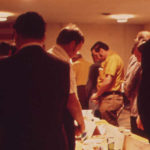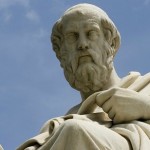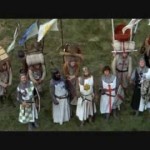We run our website the way we wished the whole internet worked: we provide high quality original content with no ads. We are funded solely by your direct support. Please consider supporting this project.
My Car Crash and the Open View
Last Saturday night Shelley and I were involved in a rather serious four car crash on a local highway. One person was hospitalized, and I’m being treated for neck pain and an on-going dull headache. But thankfully, no one was critically injured. In any event, the crash inspired several folks to e-mail or tweet questions regarding how I process this accident from an open theistic perspective, so I thought I’d address one of these questions in this blog.
Several people wondered if I believed that Shelley and I could have perhaps avoided this crash had we prayed for protection (if we didn’t) or if we and others might have been more seriously injured had we not prayed for protection (if we did). Great question! I absolutely believe praying for protection (and everything else) makes a significant difference in what comes to pass. In my view, God set up things up in the beginning such that his influence in the world is increased when his human partners align their will with his will through prayer. He wants to bring about his will “on earth as it is in heaven” through us. He’s looking for a bride who will reign with him on the throne (2 Tim. 2:12; Rev 20:6). So he’s given us tremendous authority to influence what comes to pass through prayer (as well as through other activities).
But I don’t believe prayer is magic. In my view, praying for protection doesn’t guarantee that you won’t get into a crash, or even that you won’t be killed. And the reason is not because it may be God’s will for you to get into a crash and get killed. The reason is rather that there are a multitude of variables extending back to the beginning of time that affect what comes to pass, including the free choices of human and spirit agents (e.g. angels, demons). I do not believe these other variables are completely overridden because someone prays.
One of the reasons many have trouble with this idea is that we tend to think of power in terms of coercion rather than influence. Hence, many assume that if prayer makes any difference it must make all the difference and thus guarantee a particular outcome. This is why most Christians assume that God’s will is the only variable affecting whether a person’s prayer is “answered” (that is, they “get” what they prayed for). If God wills what you pray for, in this view, he makes it happen: if he doesn’t will it, he won’t. By contrast, in the open view prayer increases God’s influence in the world (assuming that what you pray for is not contrary to God’s will), but it doesn’t cause God to coercively override all other variables.
It’s my conviction, therefore, that Shelley and I might have been more seriously injured were it not for the fact that we are continually covered in prayer (thank you prayer warriors!), but also that we might have been less seriously injured had we ourselves prayed for protection before our trip (which, I confess, we did not do). Things really hang in the balance on whether or not we pray! “If my people…will humble themselves and pray…then I will hear from heaven…and will heal their land” (2 Chron. 7:14).
If you ask me, it’s the classical view, not the open view, that has trouble making sense of prayer. For example, if it’s the case that God’s will is the only variable affecting what comes to pass, then it’s hard to see how prayer can make any real difference. If it was God’s will that we get into a crash, our praying otherwise couldn’t change this. And if it was not God’s will for us to get into our crash, then our prayers for protection are redundant. Prayer can make a difference only if things genuinely hang in the balance.
Along the same lines, according to classical theism all the facts about the future are exhaustively settled from all eternity. Some classical theists hold that God eternally willed these facts to be settled the way they are (Calvinism) while others hold that God simply eternally knows these facts to be eternally settled the way they are. Either way, the future is exhaustively settled. If this is the case, however, one has to once again wonder what difference prayer can really make. If it was an eternally settled fact that Shelley and I would be involved in a car crash on November 6th, 2010, there’s simply no way it could have been avoided, whether by prayer or any other means. (By the way, my objection to this view is not rooted in an assumption that whatever is settled in the future must be causally determined, as Bill Craig repeatedly alleges in the podcast I discussed in my previous two posts. My objection is rather rooted in the conception of the future as exclusively a domain of exhaustively settled facts. The issue over how these facts came to be settled is problematic, to be sure, but it is irrelevant to this particular objection.)
If we instead think of the future as partly open and conceive of divine power in response to prayer along the lines of influence rather than coercion, these (and many other) problems are avoided. Prayer doesn’t magically override the multitude of variables that affect what comes to pass, but it is itself a powerful variable. We can take it on faith that prayer is always “powerful and effective” (Ja 5:16). In some situations, variables are such that the increased divine influence is able to bring about what we pray for, in others not. Yet, if what we pray for is in line with God’s character and will, we can trust that things would have been worse had we not prayed.
Think about it – and keep praying!
Category: General
Tags: Open Theism, Prayer
Related Reading

Podcast: If Open Theism is True, Does it Make Sense to Pray For Intercession?
Greg talks about prayer and freedom. Specifically, if free will is so important, why would God override it in answer to prayer? http://traffic.libsyn.com/askgregboyd/Episode_0123.mp3

Is Your Christianity Shaped by Plato or the Bible?
The Timaeus is a work that Plato wrote that addresses the questions: “What is that which always is and has no becoming, and what is that which becomes but never is?” (Tim. 28a)? These questions contain one of the most influential – and, in my opinion, one of the most disastrous – philosophical ideas of…

The Future of Theology
Chris Moore via Compfight Roger Olson recently published a blog arguing that there really are no new ideas out there in the realm of theology. Everything has pretty much been thought of or proposed. That idea or book that’s causing such a stir? Rewarmed material that someone else already thought of. So what is there…

Praying for Peace During Political Hostility
Jesus calls his disciples to be “peacemakers” (Mt 5:9). During this season of political animosity, we have a great opportunity to practice being disciples by offering an alternative way of interacting with each other. One primary way we do this is by using the unique authority we have to affect the world through prayer to…

5 Ways the Bible Supports Open Theism
Open Theism refers to the belief that God created a world in which possibilities are real. It contrasts with Classical Theism which holds that all the facts of world history are eternally settled, either by God willing them so (as in Calvinism) or simply in God’s knowledge (as in Arminianism). Open Theists believe God created humans and…

Lighten Up: Oh my… I am so very very scared…
Well, my dear friend Frankie V. once again has a bad case of verbal diarrhea (explains his breath lately), running off about how he’s going to smack me down in our “all-out, no holds barred, ring-side seat, verbal wrestling match” on the open view of the future. I’m supposed to shutter in my boots at…
